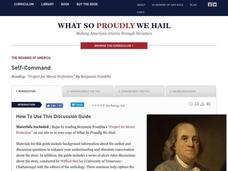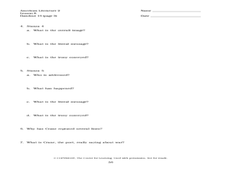What So Proudly We Hail
The Meaning of America: Freedom and Individuality
What are the strengths and weaknesses of American individualism and independence? Explore these principles through a close reading of Jack London's To Build a Fire, and engage in high-level discussion with your class by analyzing the...
Louisiana Department of Education
Fahrenheit 451
In his 2013 introduction to Fahrenheit 451, Neil Gaiman states, “Fiction is a lie that tells us true things, over and over.” In this extraordinary unit plan, readers "explore the power of written language to educate and influence...
Curated OER
Abraham Lincoln, the 1860 Election, and the Future of the American Union and Slavery
Young scholars examine the political alternatives regarding the spread of slavery and the preservation of the American union facing the American people in the decade leading up to the 1860 presidential election.
What So Proudly We Hail
The Meaning of America: Equality
What if society sought equality by handicapping the gifted and dispelling any traces of diversity? Kurt Vonnegut Jr. offers one possible answer to this question through his incredibly engaging and thought-provoking satirical...
What So Proudly We Hail
The Meaning of America: Freedom and Religion
The United States of America was founded on firm ideals of both the pursuit of happiness and a spirit of reverence. Through a close reading of Nathaniel Hawthorne's "The May-Pole of Merry Mount," you can examine what some consider was a...
What So Proudly We Hail
The Meaning of America: National Identity and Why It Matters
Combining a close reading of a classic American text with the study of history can be a very powerful strategy, and this is most certainly the case with this resource using Edward Everett Hale's The Man without a Country. Consider themes...
What So Proudly We Hail
The Meaning of America: Self-Command
Even for one of the most accomplished men in American history, there was room for improvement. Challenge high schoolers to use Benjamin Franklin's Project for Moral Perfection to analyze text, make inferences, connect to historical...
Digital Public Library of America
The American Whaling Industry
When thinking about the American whaling industry most imagine Moby Dick and Nantucket sleigh rides, harpoons and scrimshaw, whale-oil lamps and baleen in women's corsets. But it may come as a surprise that the industry was also...
Voices of a People's History
Voices in The Classroom
Everyone's perspective of the past is different. A thought-provoking unit gives young academics the opportunity to explore their perspectives on history and their neighborhoods. Based on the work of Howard Zinn, each lesson explores...
Curated OER
Attitudes Toward Emancipation
High schoolers read the Emancipation Proclamation and investigate steps that led to its signing. They read and discuss period news articles from both sides of the argument and create portfolios of documentation supporting both sides.
National Endowment for the Humanities
Slavery and the American Founding: The "Inconsistency Not to Be Excused"
High schoolers examine slavery in the revolutionary and colonial eras of the United States. In this slavery lesson, students investigate the presence of slavery in early America, the language of the Constitution, and the intent of the...
Curated OER
Fugitive Slave Narratives
Students analyze the ways slavery shaped social and economic life in the South after 1800, the different economic, cultural, and social characteristics of slavery after 1800, and the ending of the Atlantic slave trade.
Curated OER
Movement and Music: An Introduction to Slavery
Learners create a slavery timeline. They identify key leaders in the anti-slavery movement. Students are asked what they can recall about slavery. They review the following vocabulary words slavery, spirituals, abolitionists, and...
Curated OER
Courage to Be You: King Day (7th)
Learners define discrimination and relate it to their own experiences. In this discrimination lesson, students discuss feeling like a stranger and complete a personal experiences worksheet. Learners then find strategies to reduce or...
Curated OER
Emotion or Reason?
Young scholars use persuasive devices to construct oral or written arguments. In this arguments lesson, students discuss the types of persuasive devices used in arguments and form groups to select a topic to research. Young scholars...
Curated OER
Stephen Crane - Surrealism and the Antihero
Students analyze the work of Stephen Crane as a lesson plan on surrealism and an antihero. In this surrealism lesson plan, students complete discuss activities for the topic. Students then analyze Crane's poetry, his use of surrealism,...
Curated OER
Take a Ride on the Underground Railroad
Students explore the issues of American slavery, the abolitionist movements, and the pursuit of freedom that is found in art, literature, and music from that period in American history. Students determine the major personalities that...
Curated OER
Perspective on the Slave Narrative
Students work with the slave narrative as a resource for historical study and evaluate it as a work of literature; students then examine the narrative in the context of political controversy as an argument for abolition.
Curated OER
AC Filtering With Capacitors
Students investigate the properties of capacitors and discover that capacitors block DC and filter AC. They discover the function of capacitors. Students differentiate between AC and DC power. They explore the role of resistors.
Other popular searches
- Narrative Frederick Douglass
- Frederick Douglass Videos
- Vocabury Frederick Douglass
- Frederick Douglass Mural
- Frederick Douglass Review
- Frederick Douglass Vidoes
- Vocabulary Frederick Douglass




















